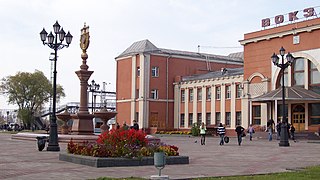
The Jewish Autonomous Oblast is a federal subject of Russia in the far east of the country, bordering Khabarovsk Krai and Amur Oblast in Russia and Heilongjiang province in China. Its administrative center is the town of Birobidzhan.

Birobidzhan, also spelt Birobijan, is a town and the administrative centre of the Jewish Autonomous Oblast, Russia, located on the Trans-Siberian Railway, near the China–Russia border.

Chabad, also known as Lubavitch, Habad and Chabad-Lubavitch, is a branch of Orthodox Judaism, originating from Eastern Europe and one of the largest Hasidic dynasties. Chabad is one of the world's best-known Hasidic movements. It is one of the largest Hasidic groups as well as one of the largest Jewish religious organizations in the world. Unlike most Haredi groups, which are self-segregating, Chabad mainly operates in the wider world and it caters to secularized Jews.

Shlomo Dov Pinchas Lazar, better known as Berel Lazar, is an Orthodox, Chabad-Lubavitch Hasidic rabbi. He began his service in Russia in 1990. Known for his friendship with Vladimir Putin, since 2000, he has been a Chief Rabbi of Russia, and chairman of the Federation of Jewish Communities of Russia and Federation of Jewish Communities of the CIS. In September 2005 Lazar became a member of the Public Chamber of Russia. Because of his connections to Russian President Vladimir Putin he is sometimes called "Putin's rabbi."

The Birobidzhaner Shtern is a newspaper published in both Yiddish and Russian in the Jewish Autonomous Oblast of Russia. It was set up in November 1930 in Birobidzhan to cater for the newly arrived Jewish immigrants. It is the oldest national newspaper in the region.

Ohr Avner Foundation is a philanthropic foundation that was established in 1992 by the Israeli billionaire and émigré from the former Soviet Union, Lev Leviev and is managed by its Director Rabbi David Mondshine. The foundation was named in memory of Lev Leviev's father Rabbi Avner Leviev. It supports a large network of Jewish educational institutions in the former Soviet Union, such as Jewish day schools, kindergartens and youth camps, a resource center and a teachers training institute.
Adolf Solomonovich Shayevich is a Soviet and Russian Orthodox rabbi who has been the rabbi of the Moscow Choral Synagogue since 1983, which is traditionally regarded as Moscow's main Jewish house of prayer.
Mordechai Sheiner is an Israeli Orthodox rabbi associated with the Chabad Hasidic movement. Sheiner served as Chief Rabbi of Jewish Autonomous Oblast from 2002 to 2011.

Nikolay Mikhaylovich Volkov is a Russian politician.

Alexander Aronovich Vinnikov is a Russian politician and formerly the governor of the Jewish Autonomous Oblast.
Lev Grigorievich Toitman was a soldier in World War II. Toitman is known for the "foundation and revival of the local Jewish community" in Birobidzhan.
Nayfeld is a village (selo) in Birobidzhansky District of the Jewish Autonomous Oblast, located 40 kilometers (25 mi) from Birobidzhan. One of the early Jewish settlements in the area, it was founded in 1928.
Birofeld is a village (selo) in Birobidzhansky District of the Jewish Autonomous Oblast, Russia. It is an early Jewish settlement, which was founded in 1928 when a large collective farm was established in the area. In 2003, a Jewish Book Festival took place here. In 2006, Chief Rabbi of the Jewish Autonomous Oblast, Mordechai Scheiner, visited Birofeld with the Jewish community of Birobidzhan. As of 2007, some of the original Jewish settlers still lived here.
Yiddishkeit is a Russian documentary television show concerning the subject of Yiddishkeit. Since 2005, when the show had begun taking its current format, it is edited by Tatyana Kadinskaya, directed by Natalya Kaper and filmed by Oleg Veksler. The former Chief Rabbi of the Jewish Autonomous Oblast, Mordechai Scheiner, and his wife, Esther Scheiner, were often guests who hosted parts of the show. Before 2005, various programs related to Yiddish and Jewish subjects were regularly broadcast by the local television without a specific name.
The history of the Jews in the Jewish Autonomous Oblast (JAO), Russia, began with the early settlements of 1928.
Boris "Dov" Kaufman is a native Birobidzhan rabbi. Rabbi Kaufman has been a part of the Jewish Autonomous Oblast's Jewish community through its transitions from the 1990s into the 21st Century. His congregation has been transformed, as has he, from practicing a blend of Jewish and Christian religious practices to mainstream Judaism. Rabbi Kaufman is the leader of Beit T'shuva, a small Jewish community located in Birobidzhan's old synagogue.

The Beit T'shuva Synagogue is a Jewish congregation and synagogue, located at 7 Mayakovskogo Street, in the city of Birobidzhan, in the Jewish Autonomous Oblast of Russia.

The Bolshaya Bronnaya Synagogue is a Chabad Jewish congregation and synagogue, located at 6 Bolshaya Bronnaya Street in Moscow, Russia.

The Organization for Jewish Colonization in Russia, commonly known by its transliterated acronym of ICOR, was a Communist-sponsored mass organization in North America devoted to supporting the settlement of Jews in new collective settlements, firstly in the newly established Ukrainian Soviet Republic and Southern Russia, and latterly in the Jewish Autonomous Oblast in Siberia. The organization was founded in the United States in 1924 and soon spread to Canada.











